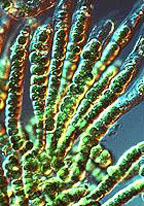
The “red tide”, once a political warning, is actually a pink algae producing a
toxin that, in high concentrations, affects the brains of animals such as
whales. Recent tests in the Lower St. Lawrence found a level of 50,000 organisms
per litre of water; toxicity being reached at 2,000 organisms per litre.
Hundreds of dead sturgeon and birds and 15 dead whales have been found, leading
scientists to link the deaths to algae forced by chemicals from agricultural
runoff.
More concerning is the spread of blue-green algae during the last decade. In
Quebec, for example, in 2007 more than 156 lakes and rivers were stressed, up
from 50 in 2005 and 107 in 2006. It is flourishing out of control, say the
scientists, because of an excess of nutrients in the water, primarily
phosphorus.
The National Academy of Sciences report the rising of “dead zones” globally.
Professor Robert Diaz, Virginia Institute of Marine Science, states that the
number of dead zones – areas of the sea floor with too little oxygen to support
life – has doubled each decade since 1960, now covering an area the size of New
Zealand.
The glaring areas are the mouth of the Mississippi River,
in the United States and the Baltic Sea. They are now the key stressors of
marine ecosystems (along with overfishing) killing fish, crustaceans and massive
amounts of marine life at the bottom of the food chain.
The wisdom traditions of ancient and aboriginal societies teach that everything
is connected. Science tells us that for every action there is reaction. Dead
zones are clearly the result of human activity. Some Provincial governments have
taken tiny steps to mandate natural buffer zones to protect lakes and river from
agricultural, municipal and cottage development.
The Government of Canada will soon be passing regulations
banning the use of phosphates in domestic dishwasher and laundry detergents. The
need to cooperate with nature is clear, not just for a given economic value but
to nurture the visible and invisible natural life processes, which are of
invaluable wealth.